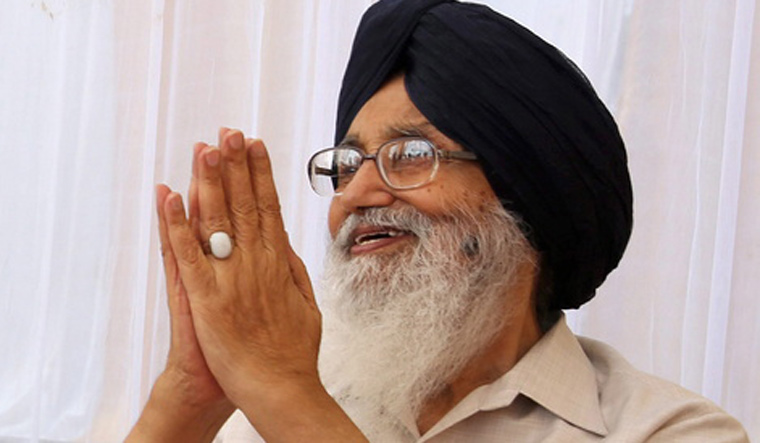Since its formation in 1920, the Akali Dal has been representing Sikh interests and political aspirations, and for the last 70 years, Parkash Singh Badal has been its most recognisable face. His passing away left a leadership void in the state which is already facing a political vacuum as veteran leaders have faded from the scene.
Parkash Singh Badal’s Shrimoni Akali Dal was the oldest ally of the BJP when the saffron party launched the National Democratic Alliance, giving it a much-needed national character. The alliance between Akali Dal and BJP, particularly in Punjab, had been hailed to be in the national interest as it meant that the party presenting Sikh interests aligned with the one with a Hindu identity. This was important as the border state was emerging from the trauma of decades-long terrorism, and the alliance between such political outfits provided the much-needed healing touch.
The shift in the party’s stance began since its Moga conference in 1996 when it shifted focus from being a mere panthic party. Badal, Atal Bihari Vajpayee and L.K. Advani had grown close due to their anti-Congress stance and held joint protests during the Emergency.
The alliance worked in favour of both parties as it meant that for the first time, a non-Congress CM completed a full five-year term in Punjab. Badal, who had been chief minister twice—from 1970 to 1971 and from 1977 to 1980—proved to be third time lucky when he aligned with the BJP and completed a full term after being elected in 1997. Again, he completed two consecutive terms from 2007 to 2017.
When Prime Minister Narendra Modi filed his nomination from Varanasi, and BJP chief Amit Shah from Ahmedabad in 2019, Badal accompanied them. The relations between the alliance partners soured after the farmers' protests as Akali Dal bore the brunt of the peasantry which was its core support base. Both the parties, Akali Dal and BJP, need each other to recover their lost ground.
Known for his earthy humour and humility, Badal had admirers in all parties, and he could rise above political rivalries to maintain camaraderie with leaders of different shades. A seasoned politician, he was secular, liberal and open-minded. His ability to listen and connect with ordinary workers made his party acceptable across the state. He led the party as the president from 1995 to 2008, after that, there had been a slide in the party’s fortunes.
As Akali Dal (Badal) represented the moderate ideology, and Parkash Singh helmed the party, it could assimilate and act as a cushion to the radical panthic ideology. As Badal’s influence waned with advanced age, and his son Sukhbir Badal struggled to keep their supporters together, the party's hold in the state reduced. The emergence of Sikh preacher Amritpal Singh, and the victory of a vocal votary of Khalistan, Simranjit Singh Mann, who had been rejected electorally for decades, from Sangrur Lok Sabha in 2022 bypoll showed the vacuum in the moderate political space in the state.
The party faced an existential crisis when it was relegated to a third position in 2017 assembly elections, and finished behind debutant Aam Admi Party. In 2022, Akali Dal could win only three seats. Badal was forced to contest the last assembly elections at the age of 94—a record in itself—but lost. This was his second loss since 1967. In 1970, when he was appointed the chief minister at the age of 43, he held the record to be the youngest person to the CM.
Now, the Akali Dal faces a crisis of credibility, with its dwindling core constituencies. The demographics are changing in the state. The Sikh youth are migrating abroad, and most attendants at Akali Dal rallies are mostly old hardcore supporters. As Akali Dal is changing its political engagement to get a larger pool of voters, it will miss the towering presence of Parkash Singh Badal.
Punjab, being a border state dominated by Sikhs, needs a regional party that has national interests in mind the way Akali Dal under Badal had done during the tumultuous decades since the state was divided on the basis of language.
The debacle in two consecutive assembly elections 2017 and 2022 forced Akali Dal to pitch it as the sole regional-secular party for the Punjabis as it also aligned with BSP. A worry is that a similar poor show in 1972 by Akalis when it could gather only 24 seats had forced it to take a hard line. The Anandpur Sahib resolution of 1973 was brought in to talk about Sikh aspirations and greater power. It talked about Khalsa rule which later got interpreted as the demand for a separate state of Khalistan. The fading Akali Dal could mean more space for radical elements in the state.
The state needed Badal more than ever.
Parkash Singh Badal, a secular, liberal and open-minded leader admired by all
His passing away leaves a leadership void in Punjab

📣 The Week is now on Telegram. Click here to join our channel (@TheWeekmagazine) and stay updated with the latest headlines
Read more
-

Amid attacks on allies, Iran's Khamenei changes tone, warns Israel, US of ‘crushing response’
-

It's official! Ruben Amorim will take over as Manchester United manager from THIS date!
-

Bengali community irked by 'The Great Indian Kapil Show' 'disrespecting' Tagore’s song 'Ekla Cholo Re'
-

Will Coal India arrest its profit slide as it enters 50th year?
-

What makes Ladakh best suited for analog space mission of ISRO which simulates Mars and Moon conditions
*Articles appearing as INFOCUS/THE WEEK FOCUS are marketing initiatives

